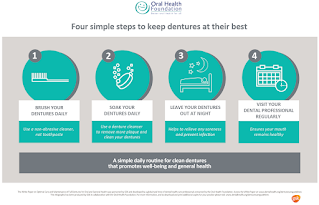Denture Care
Introduction
The older you are, the more likely you are to have lost all, or nearly all, your natural teeth. Dentures are custom-made prosthetic devices used to replace missing teeth. There are 2 types of removable dentures: complete and partial.
Dentures are made for people who have lost some or all of their teeth, to help
- improve their appearance
- support their lips and cheeks
- improve their self-esteem and confidence
- improve their chewing ability and so help maintain healthy nutrition
Care and Maintenance of Dentures
Careful daily removal of the bacterial biofilm present in the oral cavity and on complete dentures is important to minimize oral tissue irritation (denture stomatitis) and to help contribute to good oral and general health. To reduce levels of biofilm and potentially harmful bacteria and fungi, patients who wear dentures should
- Dentures should be cleaned daily by soaking and brushing with an effective, nonabrasive denture cleanser. Afterward, they should be thoroughly rinsed before putting them back inside the mouth.
- Dentures should not be soaked in sodium hypochlorite bleach, or products containing sodium hypochlorite bleach, for periods of more than 10 minutes. Placement of dentures in sodium hypochlorite solutions for periods longer than 10 minutes may damage dentures.
- Denture cleansers are not to be used inside the mouth.
- Dentures should never be placed in boiling water.
Dentures should not be worn continuously (24 hours per day) as this can cause denture stomatitis.
- Dentures should be stored immersed in water (or denture-cleansing solution) when not in use to avoid warping. Dentures that dry out can permanently lose their shape.
Patients who wear dentures should see a dentist annually for maintenance of the denture and evaluation of the health of the oral cavity and associated tissues.
Denture adhesives can improve the retention and stability of dentures, helping prevent the accumulation of food particles beneath the dentures.
- However, evidence regarding the effects of denture adhesives on the oral tissues when used for periods longer than 6 months is lacking. Thus, extended use of denture adhesives should only be undertaken with periodic assessment by a dental professional.
- Prior to the application of any adhesive, the denture should be cleaned and dried.
- The necessary quantity of denture adhesive should be minimal and should be completely removed from the prosthesis and the oral cavity daily.
- Upper and lower dentures should be placed individually and held in place firmly for 5 to 10 seconds, after which any excess material should be removed.
- If increasing amounts of adhesive are necessary for the patient to feel comfortable, a dental professional should be consulted to evaluate the fit and stability of the dentures.

Comments
Post a Comment